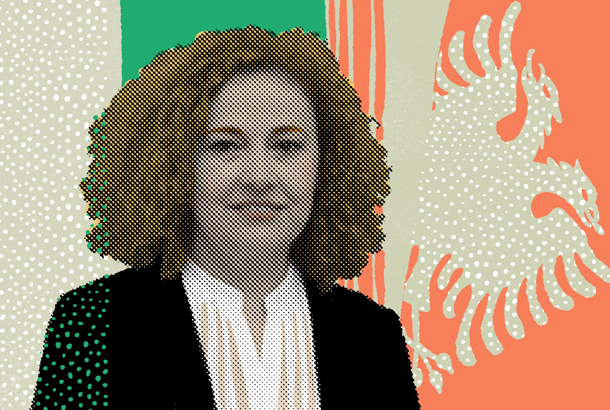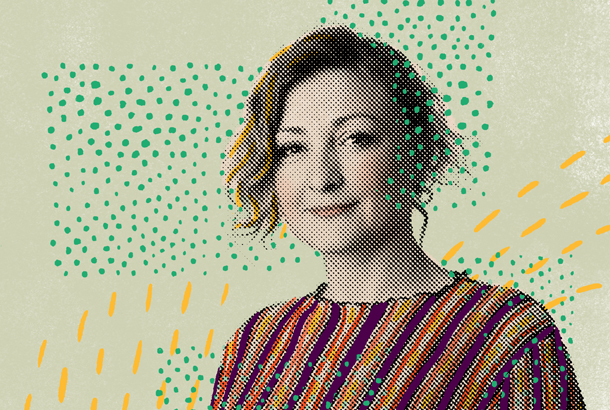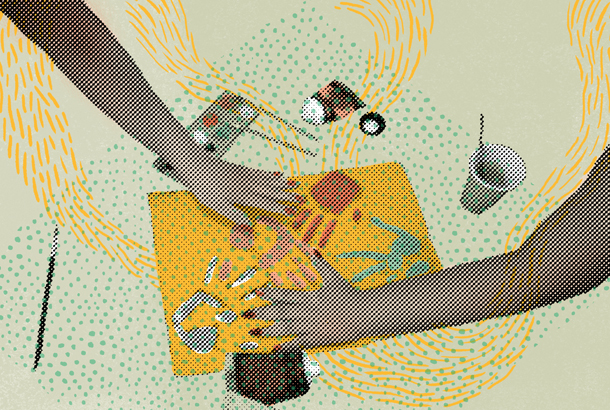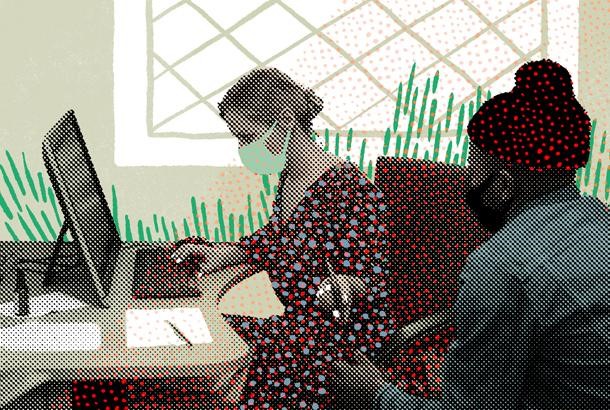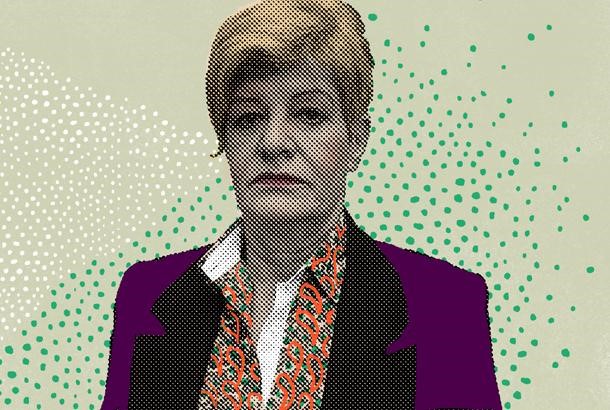Profiles from Eastern Europe Countries
Survivors and practitioners
Reintegration and empowerment for trafficking victims
Different and Equal (Albania)
Mariana Meshi, Executive Director (illustration by Vérane Cottin, photograph by Different and Equal)
What should happen when trafficking survivors finally flee or are identified by the police?
The period that follows a victim’s emergence from trafficking or sexual exploitation is the “most vulnerable” time of their recovery and reintegration, according to Different and Equal (D&E). The organization’s approach is to provide extra care and attention at this phase.
For 18 years, the organization has been implementing models of care suited to each individual’s circumstance, providing shelter, alternative care for children, psychosocial support, medical and legal aid as well as job skills training, employment and other economic empowerment support.
“The help of the psychologist, social worker, lawyer… It made me believe more in life!” said Sonya*, a former beneficiary. “The support gave me strength! In the future, I feel that I can help those girls who have gone through the same things as me.”
Upholding the Right to Pursue Opportunities Equally
Among D&E’s beneficiaries are many women who were preyed on as teenagers by adults. Pursuing a romantic relationship, then abusing the young women’s trust, perpetrators convince them to travel abroad with the lure of employment. Ultimately, the perpetrators force them into sexual services and other forms of exploitation, resorting to blackmail to deter any attempts to escape.
Albania, like many countries in the Balkans, is considered both a source and transit point for human trafficking.
In 2010, the UN Committee on the Elimination of Discrimination against Women painted a worrying picture of the situation in Albania. It stressed the “gaps in the implementation of legislation and strategies, the low number of criminal convictions for trafficking in women, the failure to effectively protect victims of trafficking as witnesses and the lack of compensation for victims.”
D&E aims to make up for the shortfall, assisting more than 100 beneficiaries every year. Its multidisciplinary team of social workers, psychologists, doctors, lawyers and care workers puts the rights and needs of each victim of trafficking at the forefront and provides 24-hour services to survivors, seven days a week.
“Investing in improving a victim’s life can have a very extensive impact in the wider family environment and community,” said Mariana Meshi, the Executive Director of D&E. “Our work is based on the victim perspective in order to prevent, detect, protect, support and empower the survivors.”
With financial support from the UN Voluntary Trust Fund on Contemporary Forms of Slavery, D&E expanded its services and protection to children and families of victims to reduce vulnerability and avoid re-trafficking.The programme of reintegration lasts from two to five years, or as much time as it takes to establish a relationship with survivors that helps them to restore some control over their life, begin to heal from trauma and stabilize their emotional state.
In one word, Different & Equal’s vision is “a society without trafficking, exploitation, abuse or discrimination, where everyone’s rights are respected, and they are free to pursue opportunities equally.”
Different and Equal received its first grant from the United Nations Voluntary Trust Fund on Contemporary Forms of Slavery in 2009.
Turning Attention to Trafficking
ASTRA (Anti-Trafficking Action) (Serbia)
Marija Andjelkovic, Founder (illustration by Vérane Cottin, photograph by ASTRA)
In the early 1990s, Marija Andjelkovic took a job at a call centre for battered women and girls. Until then, she knew nothing about human trafficking of any form, and neither did any of her fellow workers.
A training session at the call centre opened Andjelkovic’s eyes. She started working on a project that informed people about safe migration and how to identify risks of trafficking. “We had a hotline where people could call in,” Andjelkovic told the 62nd session of the UN Commission on the Status of Women in 2018. “One day, we received a call from a trafficking victim… it was a rare case, because she was still in a trafficking situation, but had managed to get hold of a phone and explain her location.” Andjelkovic called the police, and the woman was rescued.
“We realized that prevention was not enough; we also needed to provide direct support and services to the victims,” she said.
Addressing Trafficking Holistically
One of the first civil society activists to raise the issue of human trafficking in the Balkan region, Andjelkovic eventually founded the Serbian organization ASTRA (Anti-Trafficking Action). Established in 2000, it applies a holistic approach to the human trafficking problem, dealing with all forms of human trafficking and all categories of survivors — women, children and men. With financial assistance from the UN Voluntary Trust Fund on Contemporary Forms of Slavery, it focuses on victim assistance and victims’ reintegration, as well as legal aid and legal representation, monitoring, strategic litigation and advocacy work.
ASTRA had initially set up an SOS hotline to provide resource information, but after receiving its first call from a victim, it changed its mandate to direct victim assistance. Since its creation 18 years ago, ASTRA has received more than 35,200 calls from 5,440 inquirers.
Anja* was one of them. She thought no one could help her until the Serbian social services put her in touch with ASTRA. “My greatest joy was when I realized that I could finish my education. Besides that, [ASTRA] provided a therapist who is simply always there for me. I grew as a person with her,” said Anja. “I realized I was not alone.”
Most recently, ASTRA implicated the Chinese-owned tire company, Linglong, over allegations of labour exploitation involving 500 Vietnamese people in Serbia. ASTRA's discoveries in this case prompted the European Parliament to adopt a resolution urging the Serbian authorities to investigate these crimes.
“Poverty is driving trafficking of persons. Nearly 80 percent of the victims are women and girls, predominantly trafficked for sexual exploitation. The unemployment rate is high, and all they want is a better life, but they cannot identify the signs and risks,” Andjelkovic said.
“I go on, because I cannot say to a victim that my project is finished and the funds are finished, so they can’t go to a lawyer or a doctor. I want a sustainable system in place, supported by the Government, so that the victims of trafficking don’t need Marija or ASTRA.”
ASTRA (Anti-Trafficking Action) received its first grant from the United Nations Voluntary Trust Fund on Contemporary Forms of Slavery in 2013.
Essential Protection for Survivors of Trafficking
Association for the Development of Alternative Reintegration and Education Practices (ADPARE) (Romania)
Illustration by Vérane Cottin, photograph by ADPARE
Human trafficking, especially for the purpose of sexual exploitation, remains a persistent problem in Romania. When she was 17, Ana* was trafficked from Bucharest and taken abroad to Spain. “I had a very hard life, those guys who took me abroad made a mockery of my body and my health”. She was trapped, exploited and never treated like a person.
Ana was eventually able to escape. “I managed to escape in a moment of inattention, I took advantage of the fact that they were busy with other things and I found my loophole.” Eventually, she was referred by the police to an NGO in Spain, who helped her return to Romania. She then received support from the Association for the Development of Alternative Reintegration and Education Practices (ADPARE).
ADPARE helped many women like Ana become safe, providing crisis accommodation and access to psychological support. “It was a fairy tale world for me. It was the first time in my life when someone supported me in all respects, from the financial to the psychological and emotional… I didn't know how to be happy, I was never given anything for free, I was never appreciated for anything in my entire life, and then there was my fairy tale world,” said Sofia*.
Individualized Support for Survivors
Since 2003, ADPARE has provided essential protection for and assistance to trafficking victims. The majority of victims assisted by ADPARE have experienced sexual exploitation and sex trafficking.
The UN Working Group on discrimination against women and girls, noted in a 2020 report that trafficking in women and girls remains a major concern in Romania. Despite positive developments, such as legislation providing access to assistance and protection services, challenges persist, including impunity, police corruption and inadequate use of criminal law.
With financial support from the United Nations Voluntary Trust Fund on Contemporary Forms of Slavery, ADPARE provides holistic support to transform the lives of victims of trafficking. Initially, it provides crisis accommodation to ensure the immediate safety of victims. Then, it ensures clients have access to safe housing in their communities, including at school or university, and assists them to pay their utilities.
In addition to housing, ADPARE provides support to access education or vocational training. It also provides access to critical psychological assistance and medical care. As more than a third of trafficking victims in Romania are children, ADPARE ensures families are involved in the provision of support.
The organization also provides legal representation to obtain compensation from the state, as well as psychological support through the legal process.
In a country where human trafficking remains a persistent issue, ADPARE provides individualized care to the survivors it supports. “A human being is a universe, which means that we approach each case individually, respecting the uniqueness and complexity of each person. This is our vision and philosophy of work,” said Gina-Maria Stoian, staff member at ADPARE.
The Association for the Development of Alternative Reintegration and Education Practices (ADPARE) received its first grant from the United Nations Voluntary Trust Fund on Contemporary Forms of Slavery in 2010.
*Ana’s story is a compilation of the experiences of many individuals and does not represent a real person.
Redress for People Trapped in Forced Labor
Civic Assistance Committee (Russian Federation)
Staff member and victim of sexual slavery (illustration by Vérane Cottin, photograph by Civic Assistance Committee)
Bakiya Kasimova was 25 years old when she left Uzbekistan after being offered a job in Moscow’s Golyanovo district. Kasimova’s passport was taken away by the shop owners, allegedly to settle migration issues. Even though she was hired to work, in reality she was held as a slave.
Kasimova worked from early morning till late at night, often without any lunch or sleep breaks. She was constantly beaten and sexually assaulted. As a result of rape, Kasimova became pregnant twice and each time after giving birth, her children were taken away from her.
After six years of forced labor and slavery, Kasimova ran away and sought help from the police outside the Golyanovo district. The police officers refused to take her statement and sent her back to Golyanovo. She managed to escape once more when a group of activists came to the shop to film the working conditions there.
Jointly with the lawyers of the MEMORIAL/EHRAC, the Civic Assistance Committee provided legal support to Kasimova along with three other women who were victims of slavery in the Golyanovo shops by filing a complaint to the European Court of Human Rights in 2016.
Now, Kasimova is staying in the Russian Federation while waiting for the Court’s decision. With support from the United Nations Voluntary Trust Fund on Contemporary Forms of Slavery, the Civic Assistance Committee was able to continue providing social and financial assistance to Kasimova throughout the COVID-19 pandemic and up to this day.
Providing the Necessary Assistance to Victims
The Civic Assistance Committee was founded in 1990 to provide assistance to refugees, asylum seekers, displaced people and people in difficult life situations. At the end of 2007, the organization expanded its activities to cover labour migrants due to the emergence of slave labour among migrants and the systematic violation of their rights in the Russian Federation in recent years.
Filling gaps in state services, “social workers and staff at the Committee provide counseling on various migration issues and support victims in the process of appealing to the migration service, police, courts and hospitals,” according to project coordinator Evgeniya Lyozova.
In addition to providing social, legal and humanitarian assistance to the victims of forced labor with the support of the Fund, the Civic Assistance Committee helps victims of sexual trafficking. It works with women from several African countries who have been subject to sexual trafficking and helps them to apply for asylum if they face persecution upon returning home.
“With their help, I was able to quit with the life I was forced to live, they paid for my new passport, and helped me with safe accommodation and medical treatment, and did so much to assist me with applying for asylum. They are so kind and helpful,” says Laura*, one of the victims of sexual trafficking.
The Civic Assitance Committee received its first grant from the United Nations Voluntary Trust Fund on Contemporary Forms of Slavery in 2010
Protection and Empowerment of Trafficked and Exploited Persons
Association for action against violence and trafficking in human beings - Open Gate (North Macedonia)
Lenche Markovikj (illustration by Vérane Cottin, photograph by Open Gate)
Trafficking in human in North Macedonia continues to be cause for concern, despite the progress made by the state and key international and local actors. The Universal Periodic Review of the country in 2019 noted the especially worrying trends of trafficking of children with the intention of sexual exploitation, labour exploitation, or forced marriage.
The Association for Action against Violence and Trafficking in Human Beings – Open Gate provides long-term assistance and support for victims of human trafficking to ensure their comprehensive social and economic reintegration. It addresses the needs of survivors, especially children, who have fallen prey to the organized trafficking networks that are active throughout the country.
“Telling people about what I’d been through made me feel ashamed because I was never open about it to anyone, but Open Gate gave me strength to be myself again,” said Ana*, a survivor.
“They made me feel that I am not alone and treated me like a human being worthy of love, compassion and kindness. They were always there for me: to listen, provide validation and emotional support. They helped me to get back to school and gave me hope to fulfill my dreams of studying to become a lawyer.”
Apart from providing basic social, psychological and healthcare services and legal assistance to survivors, the staff of the association takes utmost care when assisting children beneficiaries. They help them gain new skills and competencies, empowering them to successfully reintegrate into society through education.
A Trauma Informed Approach to Prevent Re-victimization
The organization uses a trauma-informed approach in all aspects of care and assistance to prevent re-victimization. “One of my priorities as an employee of the shelter is to give the victims attention, love, understanding and care without being judged for their situation and circumstances… Most of all, I and all my colleagues care about their emotional state and support in improving their mental health,” shared Lenche Markovikj, the social worker at Open Gate. Such an approach is crucial in rendering the victim to feel included, understood and empowered.
With support of the United Nations Voluntary Trust Fund on Contemporary Forms of Slavery, Open Gate was also able to increase the number of assisted persons. Increasing its presence in the field, the outreach team stepped up efforts to identify people subjected to trafficking and provided direct services to those who are not traditionally covered by state institutions. This experience confirmed that proactive action is critical to improve the identification of victims.
The Association for Action Against Violence and Trafficking in Human Beings – Open Gate received its first grant from the United Nations Voluntary Trust Fund on Contemporary Forms of Slavery in 2009.
